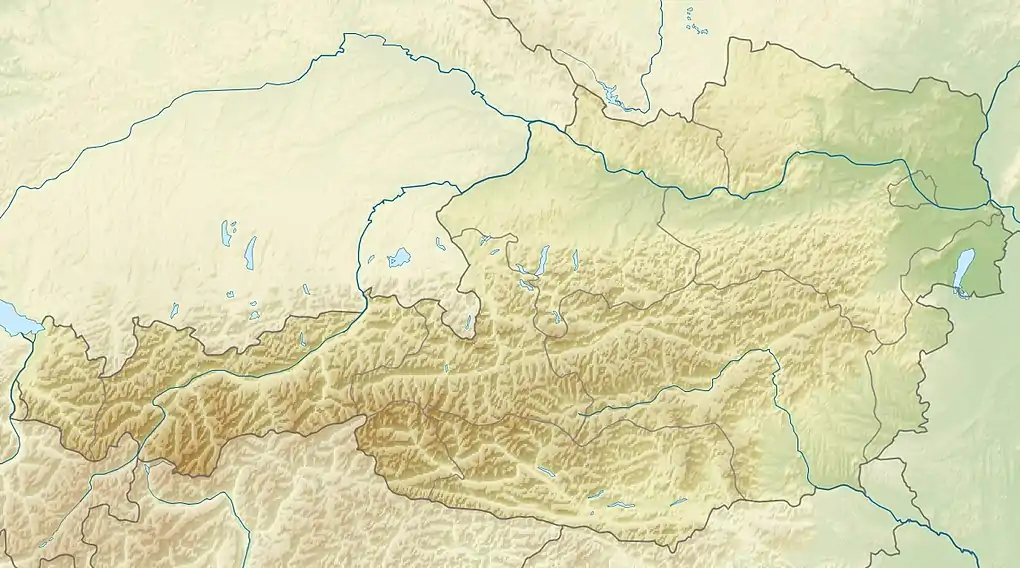| Hoher Sonnblick | |
|---|---|
 The Hoher Sonnblick (centre) and Hocharn (right rear); view from the east
 | |
| Highest point | |
| Elevation | 3,106 m (AA) (10,190 ft) |
| Prominence | 3,106-2,857 m ↓ Goldzechscharte |
| Isolation | 2.41 km → Hocharn |
| Coordinates | 47°03′14″N 12°57′23″E / 47.05389°N 12.95639°E |
| Geography | |
| Parent range | Goldberg Group |
The Hoher Sonnblick (also Rauriser Sonnblick) is a glaciated mountain, 3,106 m (AA) high, on the main Alpine chain in the Goldberg Group on the border between the Austrian states of Carinthia and Salzburg. At its summit is the Sonnblick Observatory and the Alpine refuge hut of Zittelhaus.
Location and area

The mountain rises at the head of the Hüttwinkltal valley, the upper part of the Raurisertal, on the Alpine divide. It is a mighty massif with a characteristic rock pyramid on the summit block and a great North Face above Kolm-Saigurn. The highest summit of the Goldberg Group is not the Hoher Sonnblick, however, but the 3,254-metre-high Hocharn to the north.
On the steep summit, at a height of 3,106 metres, is a meteorological observatory, the Sonnblick Observatory, and an Alpine refuge hut, the Zittelhaus (also written Zittlhaus). At a height of 2,718 metres is the Rojacher Hut and at 2,175 metres is the Schutzhaus Neubau. Both huts are managed during the summer months.
On 1 January 1905, a temperature of −37.4 °C (−35.3 °F) was recorded at the summit, the lowest temperature recorded in Austria at that time.[1]
In the area of the Sonnblick there are historical gold mines, which gave their name to the mountain range around the Sonnblick, the Goldberg Group. Relics of gold digging still exist in the area; Kulm-Saigurn is an ancient mountain mining settlement. At the foot of the Sonnblick it is still possible to pan for gold.
Literature and maps
- Liselotte Buchenauer, Peter Holl: Alpine Club Guide Ankogel- und Goldberggruppe. Bergverlag Rudolf Rother, Munich, 1986. ISBN 3-7633-1247-1
- Ingeborg Auer, Reinhard Böhm, Martin Leymüller, Wolfgang Schöner: Das Klima des Sonnblicks – Klimaatlas und Klimatographie der GAW-Station Sonnblick einschließlich der umgebenden Gebirgsregion, ZAMG, Vienna, 2002, ISSN 1016-6254.[2]
- Alpine Club Map Sheet 42, 1:25,000 series, Sonnblick
Climate
Sonnblick has a tundra climate (Köppen ET).
| Climate data for Sonnblick: 3109m (1991−2020 normals) | |||||||||||||
|---|---|---|---|---|---|---|---|---|---|---|---|---|---|
| Month | Jan | Feb | Mar | Apr | May | Jun | Jul | Aug | Sep | Oct | Nov | Dec | Year |
| Record high °C (°F) | 3.3 (37.9) |
3.9 (39.0) |
2.2 (36.0) |
4.3 (39.7) |
8.9 (48.0) |
15.3 (59.5) |
14.3 (57.7) |
14.3 (57.7) |
10.4 (50.7) |
8.0 (46.4) |
5.0 (41.0) |
2.6 (36.7) |
15.3 (59.5) |
| Mean daily maximum °C (°F) | −8.6 (16.5) |
−10.2 (13.6) |
−7.2 (19.0) |
−4.2 (24.4) |
−0.3 (31.5) |
3.7 (38.7) |
5.8 (42.4) |
5.8 (42.4) |
1.9 (35.4) |
−0.9 (30.4) |
−4.9 (23.2) |
−7.7 (18.1) |
−2.2 (28.0) |
| Daily mean °C (°F) | −11.3 (11.7) |
−12.0 (10.4) |
−9.8 (14.4) |
−6.7 (19.9) |
−2.5 (27.5) |
1.3 (34.3) |
3.4 (38.1) |
3.6 (38.5) |
−0.1 (31.8) |
−3.0 (26.6) |
−7.1 (19.2) |
−10.3 (13.5) |
−4.5 (23.8) |
| Mean daily minimum °C (°F) | −13.2 (8.2) |
−15.4 (4.3) |
−11.8 (10.8) |
−9.1 (15.6) |
−4.6 (23.7) |
−1.1 (30.0) |
0.9 (33.6) |
1.3 (34.3) |
−2.2 (28.0) |
−4.8 (23.4) |
−9.2 (15.4) |
−12.2 (10.0) |
−6.8 (19.8) |
| Record low °C (°F) | −29.4 (−20.9) |
−31.9 (−25.4) |
−30.0 (−22.0) |
−25.0 (−13.0) |
−16.1 (3.0) |
−12.3 (9.9) |
−8.2 (17.2) |
−9.3 (15.3) |
−13.0 (8.6) |
−19.5 (−3.1) |
−24.9 (−12.8) |
−30.5 (−22.9) |
−31.9 (−25.4) |
| Average precipitation mm (inches) | 149.5 (5.89) |
128.3 (5.05) |
169.3 (6.67) |
163.3 (6.43) |
164.8 (6.49) |
156.8 (6.17) |
173.6 (6.83) |
175.0 (6.89) |
130.4 (5.13) |
142.0 (5.59) |
159.1 (6.26) |
155.5 (6.12) |
1,867.6 (73.52) |
| Source: Central Institute for Meteorology and Geodynamics[3] | |||||||||||||
| Climate data for Sonnblick (1981–2010 normals, extremes 1886–2010) | |||||||||||||
|---|---|---|---|---|---|---|---|---|---|---|---|---|---|
| Month | Jan | Feb | Mar | Apr | May | Jun | Jul | Aug | Sep | Oct | Nov | Dec | Year |
| Record high °C (°F) | 3.3 (37.9) |
3.6 (38.5) |
3.9 (39.0) |
5.0 (41.0) |
9.4 (48.9) |
14.1 (57.4) |
15.7 (60.3) |
13.4 (56.1) |
13.0 (55.4) |
10.0 (50.0) |
6.1 (43.0) |
2.2 (36.0) |
15.7 (60.3) |
| Mean daily maximum °C (°F) | −9.0 (15.8) |
−9.8 (14.4) |
−8.0 (17.6) |
−5.0 (23.0) |
−0.5 (31.1) |
2.8 (37.0) |
5.6 (42.1) |
5.3 (41.5) |
1.7 (35.1) |
−0.9 (30.4) |
−5.5 (22.1) |
−8.2 (17.2) |
−2.6 (27.3) |
| Daily mean °C (°F) | −11.5 (11.3) |
−12.3 (9.9) |
−10.7 (12.7) |
−7.6 (18.3) |
−2.8 (27.0) |
0.3 (32.5) |
2.8 (37.0) |
2.7 (36.9) |
−0.5 (31.1) |
−3.1 (26.4) |
−7.9 (17.8) |
−10.7 (12.7) |
−5.1 (22.8) |
| Mean daily minimum °C (°F) | −13.9 (7.0) |
−14.6 (5.7) |
−12.9 (8.8) |
−9.7 (14.5) |
−4.9 (23.2) |
−2.0 (28.4) |
0.5 (32.9) |
0.6 (33.1) |
−2.4 (27.7) |
−4.9 (23.2) |
−10.0 (14.0) |
−13.0 (8.6) |
−7.3 (18.9) |
| Record low °C (°F) | −37.4 (−35.3) |
−36.6 (−33.9) |
−34.6 (−30.3) |
−26.6 (−15.9) |
−20.0 (−4.0) |
−15.8 (3.6) |
−10.5 (13.1) |
−10.0 (14.0) |
−16.4 (2.5) |
−25.4 (−13.7) |
−28.5 (−19.3) |
−33.0 (−27.4) |
−37.4 (−35.3) |
| Average precipitation mm (inches) | 183 (7.2) |
140 (5.5) |
203 (8.0) |
241 (9.5) |
225 (8.9) |
159 (6.3) |
220 (8.7) |
204 (8.0) |
218 (8.6) |
174 (6.9) |
127 (5.0) |
169 (6.7) |
2,263 (89.1) |
| Average snowfall cm (inches) | 220 (87) |
208 (82) |
287 (113) |
254 (100) |
179 (70) |
109 (43) |
58 (23) |
46 (18) |
103 (41) |
149 (59) |
238 (94) |
252 (99) |
2,103 (828) |
| Average precipitation days (≥ 1 mm) | 14.8 | 14.4 | 18.0 | 19.1 | 16.6 | 18.2 | 17.5 | 16.2 | 13.7 | 12.7 | 15.4 | 16.2 | 192.8 |
| Average relative humidity (%) (at 14:00) | 75.8 | 77.7 | 85.3 | 89.9 | 90.7 | 90.8 | 89.5 | 88.7 | 87.2 | 81.0 | 80.5 | 79.1 | 84.7 |
| Mean monthly sunshine hours | 141 | 146 | 153 | 133 | 144 | 143 | 165 | 158 | 155 | 169 | 123 | 115 | 1,746 |
| Percent possible sunshine | 50.5 | 49.9 | 42.4 | 33.1 | 31.9 | 31.2 | 35.3 | 36.8 | 41.8 | 50.3 | 43.3 | 43.8 | 40.9 |
| Source 1: Central Institution for Meteorology and Geodynamics (precipitation days 1971-2000)[4][5][6][7][8][9] | |||||||||||||
| Source 2: ECA&D (extremes)[10] zamg.ac[11] | |||||||||||||
| Climate data for Sonnblick (1971–2000) | |||||||||||||
|---|---|---|---|---|---|---|---|---|---|---|---|---|---|
| Month | Jan | Feb | Mar | Apr | May | Jun | Jul | Aug | Sep | Oct | Nov | Dec | Year |
| Record high °C (°F) | 3.3 (37.9) |
3.5 (38.3) |
1.2 (34.2) |
3.8 (38.8) |
9.0 (48.2) |
11.7 (53.1) |
15.0 (59.0) |
13.4 (56.1) |
12.0 (53.6) |
9.3 (48.7) |
6.0 (42.8) |
2.0 (35.6) |
15.0 (59.0) |
| Mean daily maximum °C (°F) | −9.4 (15.1) |
−9.8 (14.4) |
−8.4 (16.9) |
−5.7 (21.7) |
−1.0 (30.2) |
2.1 (35.8) |
4.8 (40.6) |
4.8 (40.6) |
1.7 (35.1) |
−1.5 (29.3) |
−6.0 (21.2) |
−8.2 (17.2) |
−3.1 (26.4) |
| Daily mean °C (°F) | −11.7 (10.9) |
−12.2 (10.0) |
−10.9 (12.4) |
−8.3 (17.1) |
−3.3 (26.1) |
−0.4 (31.3) |
2.1 (35.8) |
2.3 (36.1) |
−0.6 (30.9) |
−3.7 (25.3) |
−8.3 (17.1) |
−10.5 (13.1) |
−5.5 (22.1) |
| Mean daily minimum °C (°F) | −13.8 (7.2) |
−14.4 (6.1) |
−13.0 (8.6) |
−10.4 (13.3) |
−5.4 (22.3) |
−2.6 (27.3) |
−0.1 (31.8) |
0.2 (32.4) |
−2.5 (27.5) |
−5.5 (22.1) |
−10.3 (13.5) |
−12.7 (9.1) |
−7.5 (18.5) |
| Record low °C (°F) | −32.7 (−26.9) |
−31.3 (−24.3) |
−33.2 (−27.8) |
−21.2 (−6.2) |
−16.4 (2.5) |
−12.1 (10.2) |
−8.5 (16.7) |
−9.8 (14.4) |
−13.0 (8.6) |
−19.0 (−2.2) |
−26.1 (−15.0) |
−30.5 (−22.9) |
−33.2 (−27.8) |
| Average precipitation mm (inches) | 127.5 (5.02) |
110.1 (4.33) |
152.2 (5.99) |
159.0 (6.26) |
139.1 (5.48) |
146.0 (5.75) |
164.4 (6.47) |
147.9 (5.82) |
116.9 (4.60) |
120.0 (4.72) |
145.2 (5.72) |
144.6 (5.69) |
1,672.9 (65.86) |
| Average snowfall cm (inches) | 239.0 (94.1) |
203.7 (80.2) |
282.6 (111.3) |
293.6 (115.6) |
203.6 (80.2) |
123.7 (48.7) |
72.0 (28.3) |
51.3 (20.2) |
109.1 (43.0) |
169.4 (66.7) |
246.4 (97.0) |
271.4 (106.9) |
2,265.8 (892.0) |
| Average precipitation days (≥ 1 mm) | 14.8 | 14.4 | 18.0 | 19.1 | 16.6 | 18.2 | 17.5 | 16.2 | 13.7 | 12.7 | 15.4 | 16.2 | 192.8 |
| Average relative humidity (%) (at 14:00) | 75.8 | 76.9 | 84.7 | 89.0 | 90.5 | 90.5 | 88.9 | 88.6 | 87.0 | 81.1 | 79.7 | 76.9 | 84.1 |
| Mean monthly sunshine hours | 120.4 | 131.6 | 138.7 | 128.1 | 150.7 | 145.5 | 177.4 | 179.8 | 160.7 | 163.0 | 117.2 | 108.4 | 1,721.5 |
| Percent possible sunshine | 42.9 | 44.0 | 38.0 | 32.3 | 33.6 | 31.9 | 38.2 | 41.3 | 42.6 | 46.9 | 40.3 | 40.4 | 39.4 |
| Source: Central Institution for Meteorology and Geodynamics[12] | |||||||||||||
References
- ↑ "Wetterrekorde: Der österreichische Kälterekord". www.zamg.ac.at. Archived from the original on 2011-08-31. Retrieved 2011-09-01.
- ↑ Zentralanstalt für Meteorologie und Geodynamik Wien: Bücher (retrieved 11 October 2012)
- ↑ "Klimamittelwerte 1991-2020" (in German). Central Institute for Meteorology and Geodynamics. Retrieved 20 September 2023.
- ↑ "Klimamittel 1981–2010: Lufttemperatur" (in German). Central Institution for Meteorology and Geodynamics. Archived from the original on 21 October 2019. Retrieved 20 October 2019.
- ↑ "Klimamittel 1981–2010: Niederschlag" (in German). Central Institution for Meteorology and Geodynamics. Archived from the original on 29 December 2014. Retrieved 20 October 2019.
- ↑ "Klimamittel 1981–2010: Schnee" (in German). Central Institution for Meteorology and Geodynamics. Archived from the original on 29 December 2014. Retrieved 20 October 2019.
- ↑ "Klimamittel 1981–2010: Luftfeuchtigkeit" (in German). Central Institution for Meteorology and Geodynamics. Archived from the original on 21 October 2019. Retrieved 20 October 2019.
- ↑ "Klimamittel 1981–2010: Strahlung" (in German). Central Institution for Meteorology and Geodynamics. Archived from the original on 29 December 2014. Retrieved 20 October 2019.
- ↑ "Klimadaten von Österreich 1971–2000 – Salzburg-Sonnblick" (in German). Central Institution for Meteorology and Geodynamics. Archived from the original on 12 October 2019. Retrieved 20 October 2019.
- ↑ "Custom query in ASCII". European Climate Assessment and Dataset. Retrieved February 18, 2023.
- ↑ https://www.zamg.ac.at/cms/de/klima/news/neuer-waermerekord-am-sonnblick
- ↑ "Klimadaten von Österreich 1971–2000 – Salzburg-Sonnblick" (in German). Central Institution for Meteorology and Geodynamics. Archived from the original on 12 October 2019. Retrieved 20 October 2019.
